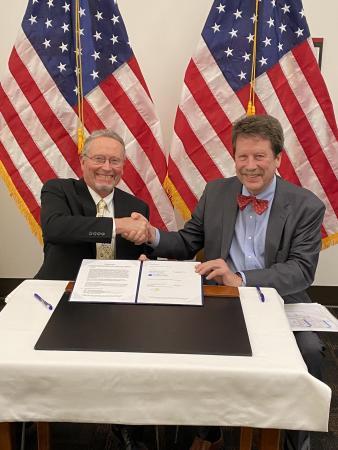New York State Formalizes Food Safety Efforts with the FDA
On February 15, 2023, the FDA signed a domestic mutual reliance partnership agreement with the New York Department of Agriculture and Markets (NYSAGM) at the National Association of State Departments of Agriculture (NASDA) 2023 Winter Policy conference. Domestic mutual reliance enables the FDA and states with comparable regulatory systems to rely on and leverage each other’s work to meet their shared public health goal of a safe national food supply.
“As the oldest comprehensive consumer protection agency in the nation, the FDA has ensured the safety of food products consumed by hundreds of millions of Americans every day for more than a century,” said FDA Commissioner Robert Califf, M.D., who attended the signing ceremony. “Our partnership agreement with New York continues this important work.”
An Innovative Approach
New York takes an innovative approach to collaborate on food safety for domestically produced foods, imported foods, and laboratory testing in conjunction with the FDA.
“We are happy to partner with the FDA, especially from an interstate commerce perspective, to ensure the foods manufactured and sold in our state are safe,” said NYSAGM Commissioner Richard Ball. “This new agreement formalizes our longstanding regulatory working relationship with the FDA and solidifies our interest as a co-regulator to reduce duplicative oversight over the facilities we both regulate, moving further our vision of an integrated food safety system in the U.S.”
In addition to New York, the FDA has established domestic mutual reliance partnership agreements with seven other states: California, Florida, Iowa, Minnesota, Utah, Virginia, and Wisconsin. The agency also has developmental and specialized partnership agreements with Alaska, Hawaii, and Rhode Island. As envisioned in the FDA Food Safety Modernization Act, Partnership for Food Protection and New Era of Smarter Food Safety blueprint, the agreements will enhance the existing relationships with states and government counterparts, moving the nation toward an integrated food safety system.
Imported Product Oversight and Laboratory Testing
New York regularly imports products from all over the world, namely via the Port of New York in New York City. The wide variety of international specialty stores and diverse products grown, distributed, and manufactured in New York amplifies the need for the focused regulatory oversight by New York that complements the work of the FDA. New York also is a long-standing leader in evaluating imported products in retail stores, with heavy metals testing for substances like lead being a common practice.
In 2018, to increase the use of state laboratory results, the FDA and New York created a domestic mutual reliance pilot program, which enabled the FDA to take regulatory action on a variety of imported products and increased efficiency for state and local governments.
“Domestic mutual reliance with our state partners has yielded many examples of coordinated food safety responses by the FDA and the states, resulting in increased and expeditious public health protection,” said Ron Pace, program division director within the FDA Office of Regulatory Affairs. “We already enjoy a strong relationship with New York and look forward to further collaboration to advance our shared mission.”
Emergency Response
FDA Emergency Response Coordinator for New York Nicole Vaught is often on the front lines navigating foodborne outbreaks and other emergencies. She explains that domestic mutual reliance has helped bolster food safety by streamlining many important processes.
“A few years ago, Michigan got lab results showing an extremely high level of lead in curry spice mix that had been imported through the Port of New York and sickened someone in Michigan. The results indicated more than 5 million parts per billion,” she said. “I actually had a chemist in the FDA’s New York Human and Animal Food Laboratory look over the results to ensure these numbers were right; she said people shouldn’t go around the spice mix without gloves and respiratory protection.”
Based on that information, Vaught called NYSAGM Rapid Response Team Coordinator Danielle Grady to coordinate next steps. NYSAGM immediately embargoed the product while the FDA ran tests and lab analyses, which resulted in a large, multi-state recall of the product.
Next Steps
Anticipated next steps related to the New York partnership agreement include closer coordination around operational functions and heightened focus on inspections conducted by a state that are not a part of the contract with the FDA and conducted under a state’s authority.
“In New York, we perform thousands of state-authorized food safety inspections each year that touch our entire food supply chain,” said Dan McCarthy, New York’s Food Safety and Inspection division director. “Our work with the FDA through this partnership agreement will give us the opportunity to apply a unified, systematic, and coordinated approach to conducting these inspections, further reducing the regulatory burden on both of our agencies and our food supply chain.”
Maria Ishida, Ph.D., NYSAGM division director of the Food Laboratory, agrees.
“Lab findings are often the foundation of enforcement and investigative activities. Enhancing our laboratory capabilities and acceptance of state lab data is one of the main components of the New York partnership agreement,” she said. “Consumers can put trust into everything we’re doing so that they have the assurance that what they buy and eat, and what they feed their families, is safe.”

